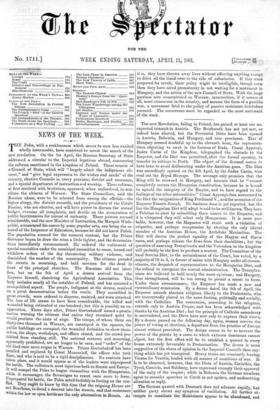NEWS OF THE WEEK.
THE Poles, with a recklessness which seems to men less excited wholly inexcusable, have contrived to arrest the march of the new revolution. On the 1st April, the Russian Secretary of State addressed a circular to the Imperial legations abroad, announcing the reforms sanctioned in the kingdom of Poland. These consist of a Council of State, which will "largely admit the indigenous ele- ment," and "give legal expression to the wishes and needs" of the country, elective Councils in every province, district and commune, and a special department of instruction and worship. These reforms, at first received with hesitation, appeared, when understood, to con- ciliate the citizens of Warsaw. The State Councillors, said the Russian ukase, were to be selected from among the officials—the higher clergy, the district councils, and the presidents of the Credit Foncier, who are elective, and will have power to discuss the annual haagpt, eTamine all complaints, and decide on the prosecution of public functionaries for misuse of authority. These powers seemed considerable, and the new Minister of Instruction, the Marquis Wielo- polski, commenced his career by some popular acts, one being the re- moval of the Inspector of Education, because he did not know Polish. The population seemed. for the moment content, but the Prince Governor began to draw the reins a little tighter, and the demonstra- tions immediately recommenced. He ordered the enlistment of special constables under the municipal committee to cease, issued and withdrew orders of the day threatening military violence, and diminished the number of the municipality. The citizens paraded the streets in mourning, and held services for the dead in front of the principal churches. The Russians did not inter- fere, but on the 6th of April a decree arrived from the Emperor himself, dissolving the Agricultural Association. This body includes nearly all the notables of Poland, and has assumed a semi-political aspect. The people, indignant at the decree, resolved on a great demonstration before the castle. They assembled in great crowds, were ordered to disperse, resisted, and were attacked. The loss of life seems to have been considerable, the killed and wounded being estimated at one hundred; but this is possibly an ex- aggeration. Three days after, Prince Gortschakoff issued a procla- mation warning the citizens that unless they remained quiet he would proclaim the state of siege. The troops, of whom there are thirty-two thousand in Warsaw, are encamped in the squares, the public buildings are occupied, the wounded forbidden to show them- selves, the shops, workshops, and offices closed, and the crowd pro- hibited from standing still. The national costume and mourning, apparently prohibited, are no longer to be seen, and "order" of the old kind once more reigns in Warsaw. Prince Gortschakoff has been recalled and replaced by Count Mouravieff, the officer who took Kars, and who is said to be a rigid disciplinarian. No contests have taken place, and it would appear as if the leaders were unprepared for battle. The collision is most injurious both to Russia and Europe. It will compel the Poles to league themselves with the Hungarians, while it encourages the Sovereigns to resort once more to force. Unprepared for battle, the Poles acted foolishly in forcing on the con- flict. They ought to know by this time that the reigning House are not Bourbons, to dread a descent into the streets, and that resistance within the law or open battle are the only alternatives in Russia. As
it is, they have thrown away lives without effecting anything except to drive all the timid over to the side of submission. If they were prepared for revolt, their policy might be intelligible, though even then they have acted prematurely in not waiting for a movement in Hungary, and the action of the new Council of State. With the large garrison now concentrated on Warsaw, insurrection, if it occurs at all, must commence in the country, and assume the form of a guerilla war, a movement fatal to the policy of passive resistance heretofore pursued. The occurrence must be regarded as the most untoward of the week.






























